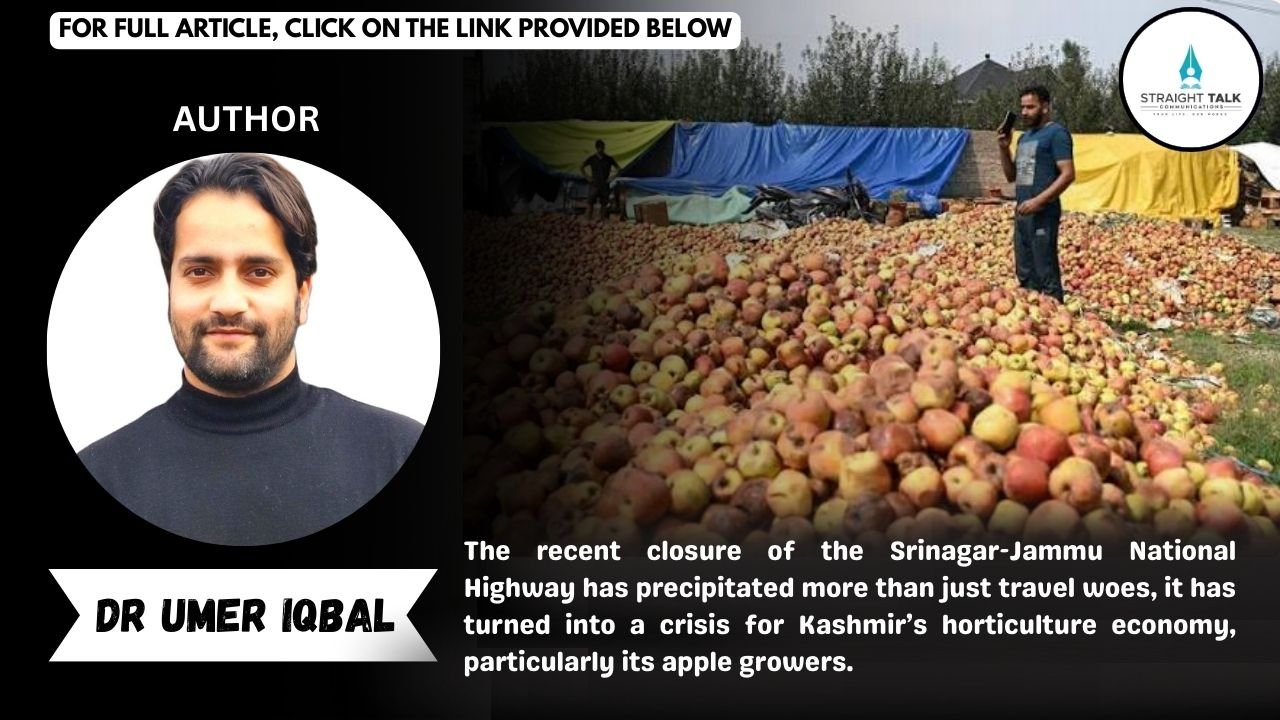Kashmir’s Apple Economy Strangled by Highway Blockage

Dr Umer Iqbal
The recent closure of the Srinagar-Jammu National Highway has precipitated more than just travel woes, it has turned into a crisis for Kashmir’s horticulture economy, particularly its apple growers. With heavy rains, landslides, and damage to key stretches of road, the Valley is now facing massive losses as apple‐laden trucks sit stranded, perishable produce rots, and markets shut down.
In late August 2025, intense rainfall and subsequent landslides severely damaged portions of the highway, especially in Udhampur district. Trucks carrying apples and other fruits have been unable to transit for over 20 days in many cases. As a result, thousands of tonnes of apples are rotting on roadsides, in trucks stuck along the highway, in fruit mandis, and in godowns.
Conservative estimates place the losses at over Rs 1,000 crore, with fruit growers reporting that 2,000–3,000 truckloads are stranded. The Valley produces about 20-25 lakh metric tonnes of apples per year, and is responsible for a large share of India’s domestic apple supply. Disruption of the supply chain thus has broader effects beyond the local growers. Packaging costs have shot up dramatically from Rs 40 per carton to Rs 200 or more as delays lengthen and more handling is needed.
Growers and traders have sharply criticised both the Jammu & Kashmir government and the Central Government for failing to swiftly restore the highway. Protests erupted in Sopore, Handwara, Kulgam, Pulwama and other fruit-growing districts. Fruit mandis have shut down for days in protest, demanding immediate relief and measures to allow apple-laden trucks to move. Agricultural associations and political parties are calling the losses “economic terrorism,” accusing bureaucratic negligence and mismanagement, and even advocating for the highway’s repair under more capable authorities.
In response, the government has initiated a parcel train service from Budgam in Kashmir to Delhi for transporting apples more directly. This is seen as a relief measure but is insufficient in scale to address the entire backlog. Meetings have been called between senior officials including the Union Ministry of Roads & Highways to coordinate repairs on the damaged stretches.
There should be proper management in the future, as the recent shutdown of the National Highway has important lessons to learn. The highway must be repaired urgently with proper engineering oversight. Delays in repairing the worst-affected stretches (like near Udhampur) are causing exponential damage. While parcel trains are helpful, more alternate routes or temporary bypasses need to be activated. Contingency plans for such high-risk monsoon seasons are essential. Given the scale of losses, the government must announce compensation packages, subsidised packaging, or support schemes to help small farmers and traders survive this season.
Given that Kashmir is prone to landslides and floods, planning must include resilient infrastructure, early warning systems, and off-season maintenance of highways. The public deserves clear timelines, regular status updates from the agencies in charge (NHAI, state roads departments), and accountability for delays. Political leadership must demonstrate urgency, not just perform ceremonial gestures.
The highway blockage is more than an infrastructure or weather issue, it has become a political and economic crisis. When apples rot by the roadside, thousands of livelihoods, from orchardists to market workers, suffer losses. The Valley’s horticultural strength is being tested. The coming days will show whether governmental response can match the urgency of the crisis, or whether the damage to Kashmir’s apple economy will become irreversible.
The author is Editor Straight Talk Communications. He can be mailed at: editor@straight-talk-communications.com







